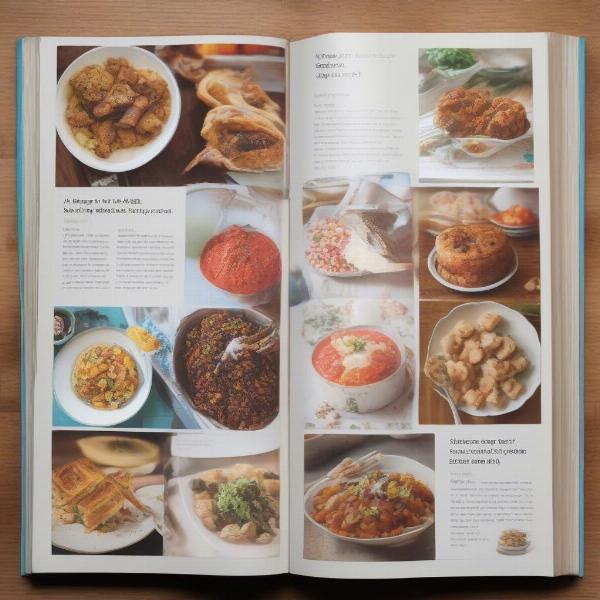Cooked dog food is becoming increasingly popular in the UK, offering a convenient and potentially nutritious alternative to raw or kibble diets. This guide will explore the benefits, considerations, and best practices for feeding your canine companion cooked meals in the UK. We’ll cover everything from nutritional needs to safe food preparation, helping you decide if cooked food is the right choice for your furry friend.
Benefits of Cooked Dog Food
Cooking your dog’s food allows you to control the ingredients, avoiding potential allergens or additives found in commercial pet food. This is particularly beneficial for dogs with sensitive stomachs or specific dietary requirements. You can tailor the meals to your dog’s age, breed, and activity level, ensuring they receive the optimal balance of nutrients. Cooked diets can also be more palatable for picky eaters, enticing them with delicious, home-cooked aromas and flavours.
Nutritional Needs of Dogs
Before embarking on a cooked dog food journey, it’s crucial to understand your dog’s nutritional requirements. Dogs need a balanced diet of proteins, fats, carbohydrates, vitamins, and minerals. Consult with a veterinarian or a qualified canine nutritionist to determine the appropriate proportions of each nutrient for your individual dog. This will help you create recipes that meet their specific needs and prevent nutritional deficiencies or imbalances. dog food sensitive stomach can offer some insights for dogs with particular dietary needs.
Safe Food Preparation for Dogs
Food safety is paramount when preparing cooked meals for your dog. Always wash your hands thoroughly before and after handling food. Use separate cutting boards and utensils for your dog’s food to prevent cross-contamination. Ensure meat is cooked to the correct internal temperature to eliminate harmful bacteria. Avoid feeding your dog certain foods that are toxic to them, such as grapes, raisins, onions, chocolate, and xylitol.
What are some common mistakes to avoid when cooking for your dog?
One common mistake is overfeeding. Portion control is vital to maintain a healthy weight for your dog. Another mistake is not considering the balance of nutrients. Don’t just feed your dog meat; ensure they receive adequate amounts of vegetables, healthy fats, and sometimes grains.
“Ensuring your dog’s cooked meals are nutritionally complete and balanced is absolutely crucial. Don’t underestimate the importance of consulting with a canine nutritionist to create tailored recipes for your dog’s individual needs.” – Dr. Emily Carter, Veterinary Nutritionist
Getting Started with Cooked Dog Food
Start by researching recipes specifically formulated for dogs.  Cooked Dog Food Recipe Book Many resources are available online and in bookstores. Introduce new foods gradually to avoid upsetting your dog’s stomach. Monitor your dog’s weight and overall health after switching to a cooked diet. bone broth for dogs uk can be a great addition to a cooked diet, offering numerous health benefits.
Cooked Dog Food Recipe Book Many resources are available online and in bookstores. Introduce new foods gradually to avoid upsetting your dog’s stomach. Monitor your dog’s weight and overall health after switching to a cooked diet. bone broth for dogs uk can be a great addition to a cooked diet, offering numerous health benefits.
Choosing the Right Ingredients
Opt for high-quality, human-grade ingredients. Lean meats, such as chicken, turkey, beef, and fish, are excellent protein sources. Include a variety of vegetables, such as carrots, broccoli, spinach, and sweet potatoes, for essential vitamins and minerals. food toppers dog can be a great way to add variety and entice picky eaters. You may also consider healthy carbohydrates like brown rice or quinoa, although the amount should be carefully controlled. Avoid using seasonings, spices, or artificial sweeteners.
“Variety is key! Just like humans, dogs benefit from a diverse diet. Rotate protein sources and vegetables regularly to ensure your dog receives a wide range of nutrients.” – Sarah Miller, Certified Dog Trainer
Cooked Dog Food vs. Other Diets
While cooked food offers many advantages, it’s essential to compare it with other options like raw food and commercial kibble. delivery raw dog food offers a convenient option for raw feeders. Consider your lifestyle, budget, and your dog’s individual needs when making the best decision for your furry companion.
Conclusion
Cooked dog food in the UK offers a personalized approach to canine nutrition. By understanding your dog’s needs, prioritizing food safety, and using quality ingredients, you can provide your dog with a delicious and nutritious diet. Remember to consult with a veterinarian or canine nutritionist for guidance and to ensure your dog’s dietary needs are met.
FAQ
- Is cooked dog food more expensive than kibble? Generally, yes, due to the higher quality ingredients.
- Can I feed my puppy cooked food? Yes, but recipes should be specifically formulated for puppies’ growth needs.
- How do I store leftover cooked dog food? Refrigerate in an airtight container for up to three days.
- Can I mix cooked food with kibble? Yes, but introduce gradually and monitor your dog’s digestion.
- What are the signs of a food allergy in dogs? Itching, skin rashes, gastrointestinal upset, and ear infections can be signs of a food allergy.
- How often should I feed my dog cooked food? Most adult dogs thrive on two meals per day.
- Is it necessary to supplement a cooked dog food diet? It depends on the recipe and your dog’s individual needs. Consult a veterinarian or canine nutritionist.
About ILM Dog
ILM Dog is your trusted resource for expert advice on all aspects of dog care and ownership. From breed selection and health to training, nutrition, and grooming, we offer practical, reliable information to help you provide the best possible care for your canine companion. We specialize in Dog Breeds and Selection, Health and Medical Care, Training and Behavior, Nutrition and Feeding, Grooming and Hygiene, and Products and Accessories. Contact us for personalized support: Email: [email protected], Phone: +44 20-3965-8624.